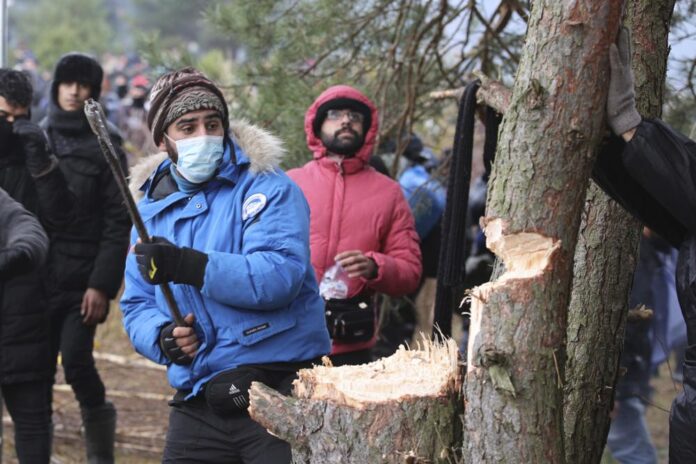
Polish riot police reinforced Poland’s eastern border on Tuesday, a day after hundreds of migrants tried to storm across the razor-wire border fence from Belarus. Thousands of migrants still remained on the Belarussian side and Polish authorities feared the tense standoff could escalate.
Polish authorities reported that the situation on the border — which is also the eastern border for the 27-nation European Union and NATO — was calm overnight and Tuesday morning, but after Monday’s border scrum they said they were bracing for any possibility.
Poland’s Defense Ministry said Tuesday that a large group of Belarusian forces was moving toward the migrants, who were camping out on the border.
Major Katarzyna Zdanowicz, from the region’s border guards, estimated 3,000-4,000 migrants were along the border, including about 800 in the vicinity of the large makeshift migrant camp. She also said there was a greater concentration of Belarusian services on the border to “control, steer and direct these people.”
She said the Polish assessment comes from aerial observations, and alleged that Belarus authorities were taking journalists to the border area to present the situation to the people of Belarus as propaganda.
There was no way to independently verify what was happening because journalists have limited ability to operate in Belarus and a state of emergency in Poland kept reporters and others out of the border area.
A day earlier, tensions flared as a large group of migrants sought to illegally push their way into Poland, escalating a crisis that has been simmering for months in which Belarus President Alexander Lukashenko’s authoritarian regime has encouraged migrants to illegally enter the EU. Belarus borders EU nations Poland, Lithuania and Latvia.
The EU reacted Tuesday by tightening visa rules for Belarus officials over what it’s calling a “hybrid attack” by Belarus against the entire bloc. EU headquarters said it was “partially suspending” an agreement it has with Belarus that eases visa rules.
The move hits Belarusian government officials, lawmakers, diplomats and top court representatives. It increases travel red tape and requires them to provide extra documents and pay more for visas.
In videos posted on Twitter by Polish police, the migrants were camping out in tents and cooking over camp fires in near-freezing temperatures. The Polish police played an announcement warning the migrants that crossing the Polish border is only allowed at official border crossings, where visas are required.
But as of early Tuesday, the nearest crossing point in Kuznica was closed.
The U.N. refugee agencies — the UNHCR and International Organization for Migration — called the situation “alarming.” They said they have been in contact with both the Polish and Belarusian governments and urged them to ensure that the large group in the makeshift camp received humanitarian assistance.
For months thousands of migrants, mostly from the Mideast, have sought to illegally enter Poland, and have often ended up stuck in a forested area of swamps and bogs, pushed back and forth between Belarusian and Polish forces.
One man who lives in Bialowieza, a Polish village in the restricted area, told The Associated Press that he has met many migrants and they are often very thirsty, hungry and in need of boots or medical care. He is among local volunteers providing food and other aid to the migrants and spoke on condition of anonymity because Polish authorities discourage such help.
“They are in really bad condition and the situation is getting worse” as the temperatures drop, he said.
He said some of the migrants are not aware of where they are, believing they are already in Germany and appeared to have been “very disinformed by Belarusian soldiers and guards.” He said some were looking for taxis, unaware that no taxis are allowed in the closed zone. So far at least eight migrants have reportedly died in the difficult crossing.
Polish Prime Minister Mateusz Morawiecki, accompanied by Defense Minister Mariusz Blaszczak, went to the border on Tuesday morning to meet with border guards and other security officials. Morawiecki praised them and said: “We do not know what else Lukashenko’s regime will come up with — this is the reality.”
Meanwhile, Lithuania’s government on Tuesday asked parliament to declare a state of emergency along the border with Belarus for a month beginning at midnight. It would reach five kilometers (three miles) inland, as well as in migrant accommodation facilities in Vilnius and elsewhere.
Poland has received strong signals of solidarity from the EU, other EU nations and the United States in the confrontation with Belarus. Analysts and some officials believe that Lukashenko is acting with the backing of Russia.
Germany’s outgoing interior minister, Horst Seehofer, said all EU countries “must stand together, because Lukashenko is using people’s fates — with the support of Russian President Vladimir Putin — to destabilize the West.”
“The Poles are fulfilling a very important service for the whole of Europe,” he said.
Many migrants have flown to Minsk, the capital of Belarus, on tourist visas, and from there travel by taxi to the border with Poland. The EU is seeking to pressure airlines not to facilitate such trips.
Although direct flights from Iraq to Minsk were suspended in August, migrants have been flying into Belarus via flights from Syria, Turkey, the United Arab Emirates and even Russia, according to recent internal EU migration reports seen by the AP.
On social media, smugglers have advertised transportation from Belarus to Germany by car. Many of the migrants have ended up in Germany, but some traveled all the way to Finland by ferry.




